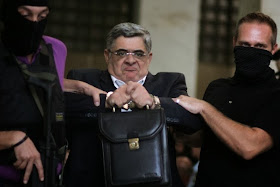7 August 2010 - Pavlo Lapshyn unsuccessfully tests explosives in his flat in Dnipropetrovsk.
20 March 2013 -
Pavlo Lapshyn's mother is severely injured in a car accident.
24 April - Lapshyn comes to the UK.
29 April - Mohammed Saleem is murdered in Birmingham.
21 May - Lapshyn adds a video on Timothy McVeigh on his social networking web-site (0:08).
22 May - Drummer Lee Rigby is murdered in Woolwich.
24 May - Lapshyn adds a video on Hitler Jugend training (20:12). Later deleted.
5 June - Posts a picture of a detonator element (03:40).
14 June - Posts a poem of Russian imprisoned neo-Nazi Nikola Korolyov (17:00). Later deleted.
21 June - Posts a picture of Timothy McVeigh along with an audio biography of McVeigh (01:34).
21 June - An attempt to bomb a mosque in Walsall.
27 June - Lapshyn posts a link to the Russian translation of William Pierce's
Hunter (0:52).
28 June - A bomb exploded at a mosque in Wolverhampton.
28 June - Lapshyn posts a link to the bogus interview with Abe Finkelstein on "Jewish domination" (23:01).
12 July - Burial of Lee Rigby.
12 July - An attempt to bomb a mosque in Tipton.
17 July - Lapshyn posts a message on the National Socialist Underground along with a song by the German White Power band Hassgesang (22:52).
18 July - The last time Lapshyn is available online (10:38).
18 July - Lapshyn arrested.
22-23 July - Charged with terror-related and other offences.
List of charges (from the
West Midlands Police press releases):
Charge 1
Pavlo Lapshyn, within the jurisdiction of the Central Criminal Court on 29 April 2013 murdered Mr Mohammed Saleem Contrary to common law.
Charge 2
Pavlo Lapshyn between 24 April 2013 and 18 July 2013 within the
jurisdiction of the Central Criminal Court within intention to commits
acts of terrorism did a series of acts to give effect to that intention
namely:
• Purchased batteries, a lunch bag, clock and green container as part of the construction an explosive device;
• Carried out internet research to identify locations to plant explosive devices;
• Visited at least one area in the West Midlands to identify where explosive devices should be place;
• Purchased chemicals via the internet to use to make explosive devices; and
• Modified mobile phones to act as detonators for explosive devices. -
The devices had at home that were ready for use but not completed.
Contrary to section 5 of the Terrorism Act 2006
Charge 3
Pavlo Lapshyn on 21 June 2013, within the jurisdiction of the Central
Criminal Court, you unlawfully and maliciously caused by an explosive
substance an explosion of a nature likely to endanger life or cause
serious injury to person or property.
Contrary to section 2 of the Explosive Substances Act 1883
Charge 4
Pavlo Lapshyn on 12 July 2013, within the jurisdiction of the Central
Criminal Court, you unlawfully and maliciously caused by an explosive
substance an explosion of a nature likely to endanger life or cause
serious injury to person or property.
Contrary to section 2 of the Explosive Substances Act 1883






















